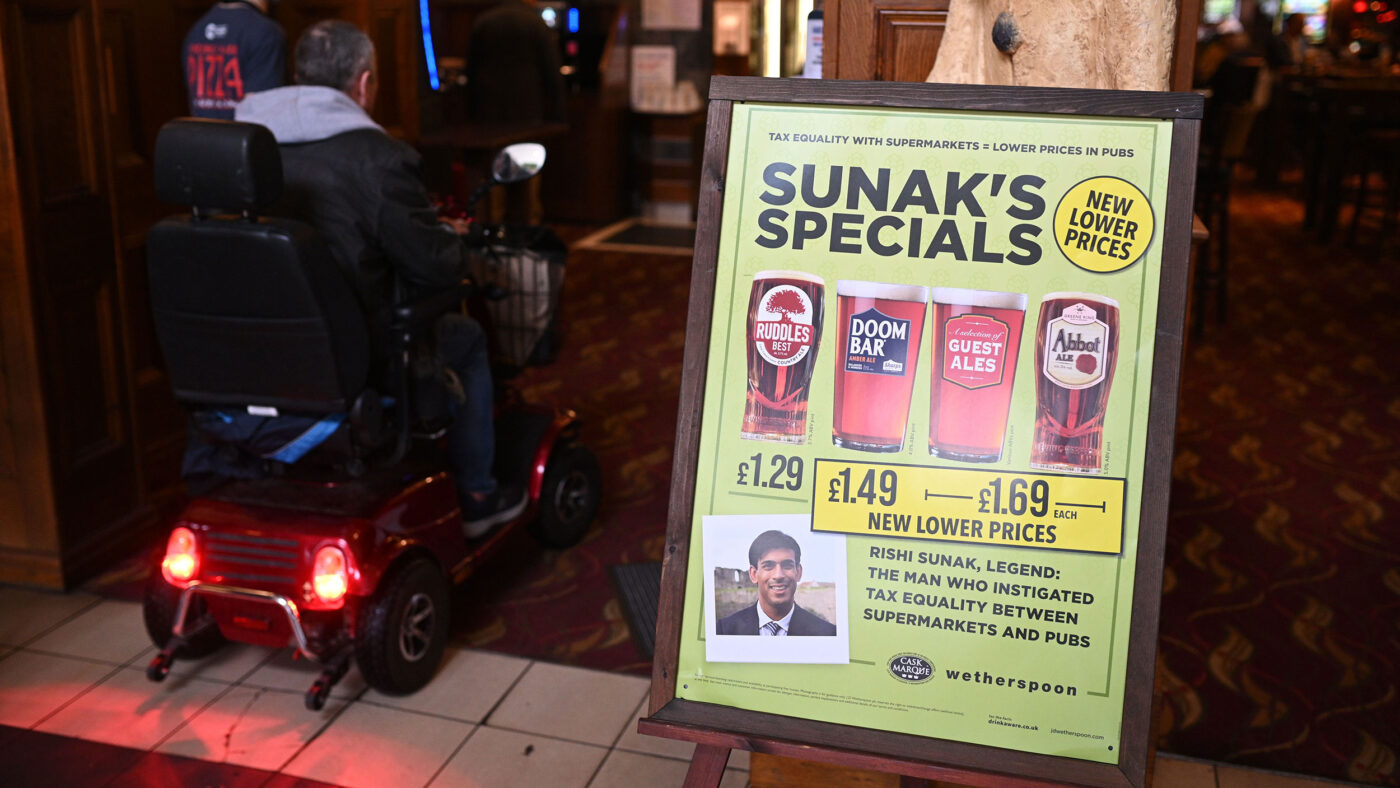There are two types of politician: those who look comfortable in relaxed, informal settings, and those who don’t. This week the chancellor, Jeremy Hunt, demonstrated how firmly he belongs in the first group when he cast aside his coat and tie and visited the Two Chairmen, a pub in Westminster popular with civil servants and the better sort of journalist. He pulled a pint in the stiff-armed manner of one who has never done so before to celebrate the ‘Brexit Pubs Guarantee’, which aims to make drinks in pubs less heavily taxed than in supermarkets. These pubs ‘can continue to thrive at the heart of communities across the UK’, in the Government’s words.
Hunt may not have rivalled Tom Cruise’s Brian Flanagan in the 1988 mixology epic Cocktail, but it could have been worse. Four miles away, the Prime Minister himself was grasping a beer pump at the Great British Beer Festival at Olympia, blowing the trumpet for the same measures. Instead he was heckled. But Rishi Sunak and his chancellor clearly think this is a good news story, that making alcoholic drinks cheaper is a winning policy with the voters.
This is not an approach which the Government applies to the other great popular vice, smoking. It is hard to imagine Sunak announcing a cut in duty on tobacco and gleefully sparking up a Marlboro Gold (no, but it would be, wouldn’t it?), emphasising how much more affordable he was making a crafty mid-afternoon cigarette. In fact, Sunak claims to have never even tried a cigarette, while Hunt, during his time at the Department of Health, aspired to a ‘smoke-free Britain’. Their cigarette cards, as it were, are on the table.
Does this make sense? It is estimated that smoking and its cavalcade of attendant illnesses cost NHS England £2.5bn a year. That is a lot of money which could be spent elsewhere. But the same metrics suggest that alcohol-related illnesses cost an extra £3.5bn. When neuropsychopharmacologist Dr David Nutt calculated the overall harms of the most frequently used drugs, legal and illegal, alcohol topped the table comfortably, while tobacco was a paltry sixth. (In between were heroin, crack cocaine, methamphetamine and cocaine.) How is the government formulating its policy?
The truth is that overall public health policy is a mess. Perhaps that’s not a bad thing in a free society. But the chief medical officer for England, Professor Sir Chris Whitty, is in fact a distinguished public health specialist, and by virtue of his position is the professional head for directors of public health in local government as well as clinicians in government. Yet he remains one cog in a large machine. It took someone of the gritted-teeth determination and turf-war wiles of his predecessor but one, Sir Liam Donaldson, to achieve a ban on smoking in public, and even he had to shelve other, more controversial measures.
There is more incoherence on the margins. At his final Budget as chancellor in 2016, George Osborne announced the Soft Drinks Industry Levy, essentially a punitive tax on sugary drinks. The Treasury estimated this would raise an extra £1bn in revenue, which was promised to be spent on funding for sport in schools. It turned out to generate between a quarter and a third of that amount, which was ring-fenced for sport only for the first year and thereafter allocated to general spending, while critics pointed out that it was deeply regressive. Sugar intake has fallen since it came into force, but obesity continues to rise. One can only speculate whether the government regards it as a success or failure.
The sugar levy merely reinforces the lack of a cogent public health strategy. When considering the consumption of all sorts of noxious narcotics and more natural hazards, the government seems to have an unscientific approach, championing a cheaper pint as a totem of British nationhood, but frowning at the 6.6m of us who smoke, a substantial number, but one in decline. Tobacco is seen as a much more sinister drug than alcohol. It is true that smoking kills many more people each year than alcohol intake, by a factor of something like eight to one, but it is the drinkers who place far more of a financial burden on ‘our’ NHS.
There will be some who believe a public health policy goes beyond the proper responsibilities of government. That’s defensible. But if there is to be a plan, then it should be cohesive. Someone at the heart of Whitehall – the health secretary – should be charged with looking at public health across departments and across policy areas, to make sure that all the oarsmen are pulling in the same direction. The alternative is simply confusion and wasted effort.
If our political overlords will insist on prohibitionist public health policies, perhaps the least big government sceptics can ask is for them to be applied in a proportionate manner. As Sir Humphrey once said to Jim Hacker in Yes Minister, ‘If you’re going to do this damn silly thing, don’t do it in this damn silly way’.
Click here to subscribe to our daily briefing – the best pieces from CapX and across the web.
CapX depends on the generosity of its readers. If you value what we do, please consider making a donation.


